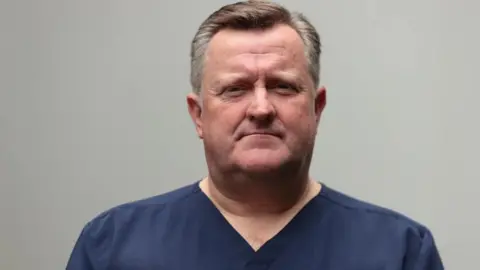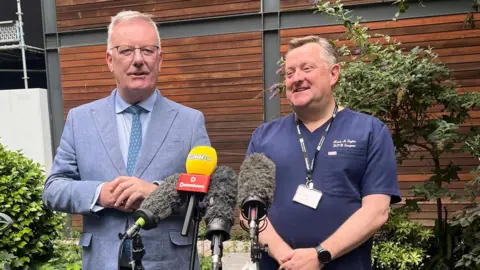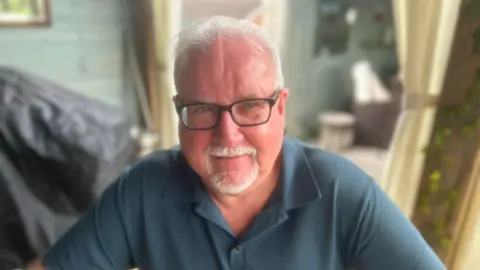BBC News NI Health Correspondent
 PA Media
PA MediaA senior surgeon appointed to tackle Northern Ireland’s health waiting lists has said the delays are “nothing short of a national shame”.
The lists are at an all-time high with some specialities recording the highest number of patients and waits across the UK.
Prof Mark Taylor acknowledged that it would be a “long-term challenge”, but said he would work “tirelessly” with his health service colleagues to turn things around.
As Clinical Director for Elective Care, his appointment is the first time someone has been directly tasked with tackling the problem.
More than half a million people are on lists to have their first consultation with a specialist.
The longest outpatient waiting list is for general surgery, followed by ENT (Ears, Nose and Throat) treatment and gynaecology, however, almost every treatment specialism list has grown.
“The minister has spoken previously about being at the foothills on it,” Prof Taylor said.
“I will be devoting all my energies to it and I know colleagues will be doing the same.”

“There are many vital facets to the ongoing drive for elective care recovery in NI – including reform, investment, improved productivity and reducing clinical variance,” said Health Minister Mike Nesbitt.
“The overriding goal, of course, has to be to get many more people off waiting lists,” the minister said.

Philip Renshaw is 66 and on a waiting list for a knee replacement.
He said his condition isn’t life threatening, but it hurts to walk and get around.
“I am on a waiting list to see a consultant about my knee I have been told by the health trust that wait could take four years – and then I will have to wait for the actual operation.”
He told BBC News NI, Prof Taylor’s appointment does not bring him any optimism “at all”.
“It’s too little too late, it’s sticking plaster politics without actually addressing the problem and making any change.
“It’ll not make any difference between now and next year so it’s not going to have any real impact for – I don’t know how long,” Mr Renshaw said.
“It should have been a priority before now, the waiting lists have been an issue for the last 10 years, it hasn’t got any better.”
Mr Renshaw said in England there is an 18-23 week wait for hip and knee replacement but in Northern Ireland it is four years or more, so “we’re basically getting a second class service”.
Following NHS England approach
The appointment is a similar approach to NHS England where a new government initiative is sending top doctors into support health trusts where more people are waiting for treatment and out of work.
It may be a result of the recent appointment of Mike Farrar as Permanent Secretary at the Department of Health (DoH).
Mr Farrar previously worked for NHS England and would have knowledge of the benefits of having clinical specialists taking the lead on waiting list initiatives.
It is a targeted approach, and data shows it is making a difference.
Analysis from BBC News NI Health Correspondent Marie-Louise Connolly:
Mark Taylor is facing a Herculean challenge.
Some people have been waiting 9 years on a list, sadly many have died while waiting.
But it is not all about the money, it’s also about having a stable workforce to staff hospital theatres 24/7.
At the moment, the workforce is in parts fragile and few hospitals, excluding perhaps the South West Acute Hospital in Enniskillen, has vacant hospital theatres.
At this stage what is not clear is just how much the independent sector will be employed and if the hospital system will be on full power seven days a week.
Perhaps the most achievable aspect of all this is communicating with patients.
People need to be able to plan their lives and told realistically when their operation or procedure will take place.
Whether this appointment is a success will depend if Prof Taylor is given the authority to make his own decisions.
Also, what is unclear if targets aren’t met and lists not cleared, who will be held to account – Mark Taylor or the health minister?
For now, Mark Taylor has stepped up to the plate – a keen cyclist – he’s aware there are hills to climb and difficult conditions to navigate.
Tackling hospital waits was listed as a priority in the Programme for Government with up to £215m earmarked for elective care initiatives in this financial year.
The funding covers three categories and includes; £85m for red flag and time critical care, £80m for building up capacity to “address the long standing mismatch with demand” and up to £50m to start tackling the backlog in care.
The Elective Care Framework plan to tackle waiting lists was published in June 2021, updated in 2024 and in May a funding plan was published.
According to the DoH, since 2022 there have been some improvements in the treatment waiting lists – that means once people get into the system and are seen by a consultant, their treatment plan tends to have less of a delay.
Transformation to date includes:
- An orthopaedic hub at Musgrave Park Hospital, between 2021 and 2024, where more than 18,000 patients have been treated
- Dedicated Day Procedure Centres at Lagan Valley and Omagh Hospitals with according to DOH statistics approximately 17,905 patients treated across a range of specialties
- Elective Overnight Stay Centres at Daisy Hill, Mater and South West Acute Hospitals, since 2023 over 18,277 patients have been treated across all three sites
- Two dedicated regional endoscopy centres within Lagan Valley and Omagh hospitals have treated 13,999 patients
- Speciality centres for cataracts at Down, South Tyrone and Mid Ulster Hospitals




